New record for Covid app self-isolation alerts as ‘pingdemic’ continues
This week the Government said it was expanding its daily contact testing for front line sectors as an alternative to isolation.

The number of people being told to self-isolate has reached another record high, with almost 700,000 alerts sent to Covid app users in England and Wales.
The so-called “pingdemic” saw a further rise last week, with 689,313 alerts sent to users of the NHS Covid-19 app telling them they had been in close contact with someone who had tested positive for coronavirus.
The latest NHS figures, for the week to July 21, are an 11% rise on the previous record high of 619,733 alerts a week earlier.
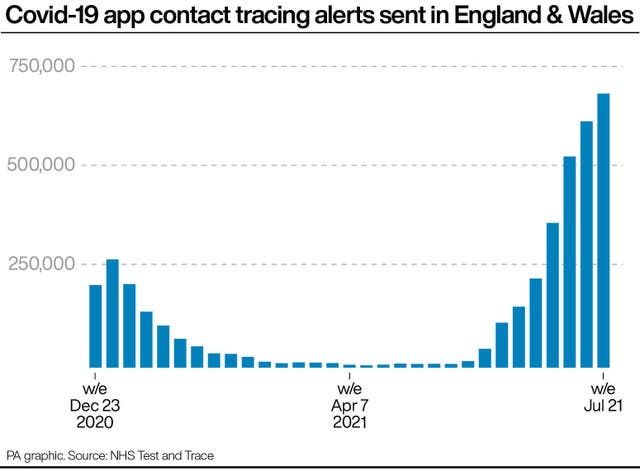
This week the Government said it was expanding its daily contact testing for front-line sectors who are exempt from isolation.
Downing Street has now confirmed that some 260 testing sites are open, while 800 more are “in the process” of being set up for support workers in critical industries.
A spokesman for the Prime Minister said: “Following them, we will then establish the remaining 1,200 over the coming days.”
Daily negative test results will enable eligible workers, including those in prisons, waste collection, defence, the food industry, transport, Border Force and police and fire services, who have been alerted by the NHS Covid-19 app or called by NHS Test and Trace as coronavirus contacts to continue working.
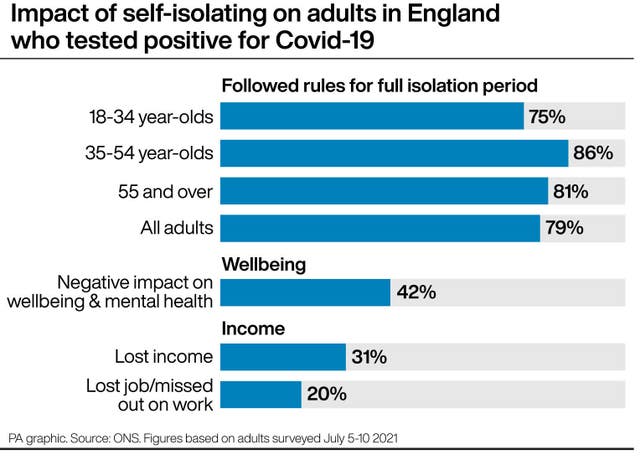
Communities Secretary Robert Jenrick urged people to isolate if they are advised to do so, saying there “isn’t very long to go” until August 16 when all fully vaccinated contacts who test negative can avoid isolation.
He told the BBC news channel: “I appreciate that it is a significant number of people and it can be frustrating but the app is doing what we asked of it.”
But one in four young adults who test positive no longer follow the rules for self-isolating, a new survey published on Thursday suggested.
The Office for National Statistics (ONS) said 75% of respondents aged between 18 and 34 said they fully adhered to the isolation requirements for the entire 10-day period after testing positive for coronavirus.
This was “statistically significantly” lower than the percentage of 35 to 54-year-olds who said they followed the rules (86%), according to the ONS, whose figures are based on responses collected from adults in England between July 5 and 10.
While there is a legal duty in England for people to self-isolate if they test positive or are contacted by NHS Test and Trace, this does not extend to notifications via the app, although the Government strongly advises people to do so.
The latest Test and Trace figures showed the proportion of people not being reached by the scheme to provide details of recent close contacts has hit the highest level for nine months, sitting at 14.8%.
The number of people testing positive in England in the week to July 21 reached 307,758, up 18% on the previous week and the highest number since January 13, according to the figures.
After a week-long fall in cases, the latest Government figures showed a rise for the second day in a row.
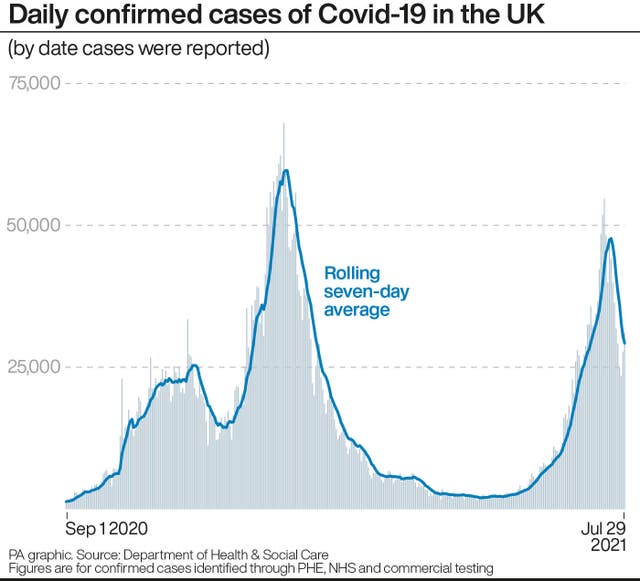
As of 9am on Thursday, there had been a further 31,117 lab-confirmed Covid-19 cases in the UK.
Meanwhile the easing of restrictions for EU and US travellers coming to England has been defended as a “smart, sensible” approach by the Government, amid concerns about the risk of a new variant emerging.
Foreign Secretary Dominic Raab said he is confident it is the right step and described the new rules on travel as a “modest opening up”.
From 4am on Monday, England is to allow people visiting from the US and the EU who are fully vaccinated against coronavirus to enter without the need to quarantine.
Labour has claimed there is a risk of allowing a new Covid variant to “run rampant” through the country, and it has been reported the Cabinet had been warned the move posed a “clear public health risk”.
Mr Raab admitted the Government “cannot guarantee” that US and EU travellers will not try to show fake vaccination certificates.
He told BBC Radio Four’s Today programme: “We can’t guarantee that some people might not do it. I think it is highly unlikely.”
Mr Raab said there is a “double lock” of written certification and proof of US residency for American travellers, which he said could allow “further checks if there is any suspicion of fraud”.
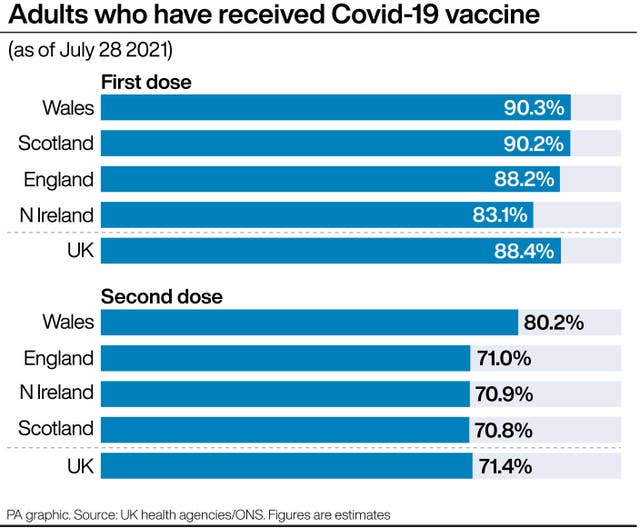
Describing the new approach as “smart, sensible”, he added: “Both domestically with our rollout but also internationally, we want to open up, we want to move the country forward, but we want to do it irreversibly and we need to take solid, surefooted steps forward.
“We feel this is a modest opening up of international travel, but one which has the reassurances that means that we can take further steps forward as we build confidence in the system.”
The Scottish Government also announced the rule change will apply to fully vaccinated EU and US visitors to Scotland from Monday.
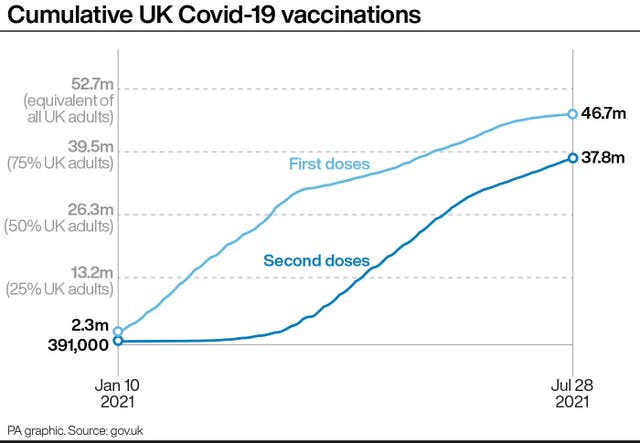
The Welsh Government said it “regrets” the move to remove the quarantine requirement in England, but added it would be “ineffective” to have different rules for Wales.
On Thursday, ministers in Northern Ireland also agreed to follow the rule change.
Currently, only travellers who have received two doses of a vaccine in the UK are permitted to enter from an amber country – such as the US and most of the EU – without self-isolating for 10 days, except those returning from France.





